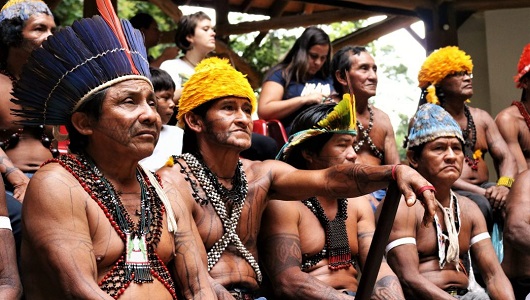Study shows that indigenous in the Amazon have their health affected by mercury
02/12/2020
Informe Ensp
In the municipalities of Itaituba and Tairão, in the state of Pará, along the Tapajós River, the munduruku indigenous population is suffering from mercury widely used in mining and panning activities. A study carried out by Fiocruz in a partnership with WWF-Brasil shows that all participants of the research are affected by the contaminant. Six out of every 10 participants presented mercury levels above safe thresholds: about 57.9% of the participants had more than 6µg.g-1, the maximum safety threshold established by health agencies.

The mining activity imposes on the mundurukus the abandonment of their traditional way of life, as it completely changes their relationship with the rivers (Photo: Adi Spezia / Cimi)
Contamination is higher in areas more heavily impacted by mining and panning, in the villages by the affected rivers. In these areas, 9 out of 10 participants showed high levels of contamination. Children are also affected: about 15.8% of them showed issues during neurodevelopment tests.
“This project was conceived to attend to a request of the Pariri Indigenous Association, which represents the munduruku population, due to the high levels of the devastation of the natural environment and of the contamination caused by mercury in the Tapajós river and in its affluents. Results show that mining and panning activities have been causing large-scale changes in the use of soil in traditional Amazon territories, with direct and indirect socio-economic impact for local populations. These include issues related to food safety, local economy, population health, and ecosystemic services”, explained Paulo Basta, study coordinator and researcher of the National School of Public Health (Ensp/Fiocruz).
In addition to the impact on rivers and forests, mining and panning activities in the Tapajós basin force the mundurukus to abandon their traditional way of life, as they fully alter the relation of this population with the rivers: from sources of life, they turn into the main threat to their physical and cultural reproduction”, highlights Danicley de Aguiar, of the Amazone Campaign of Greenpeace Brazil.
The analysis also revealed the fish, the main source of protein for those communities, are also contaminated. Data obtained from interviews show that 96% of those interviewed consume fish on a regular basis. Eighty-eight samples of fish were captured, belonging to 18 different species. All were contaminated. Starting with these figures, the study found out that the doses of daily ingestion of mercury estimated for the participants, according to the 5 species of fish-eating fish sampled, were 4 to 18 times superior to the safe limits recommended by the American Environment Protection Agency (EPA).
Fish-eating species showed the highest levels of contamination. The highest averages were reported among the black piranha (Serrasalmus rhombeus), exceeding by almost four times the maximum limit (0.5 µg.g-1) for commercialization and consumption of fish and seafood, according to the FAO/WHO.
“Indigenous populations want to know what they can eat, as contaminated fish are on our tables and the food we have comes from the river. Panning affects not only our health, but our entire social life, as it brings with it drugs, domestic violence, and prostitution. This is very worrying, and we need a solution. We need to criminalize and punish people who contaminate the river”, says indigenous leader Alessandra Korap Munduruku.
The survey also includes a series of recommendations, including the immediate interruption of panning in indigenous lands, a plan to discontinue the use of mercury in panning, and a risk management plan for populations chronically exposed to mercury. Data were collected between 29 October and 9 November 2019, among 20 inhabitants of three villages impacted by panning: Sawré Muybu, Poxo Muybu and Sawré Aboy. The process included interviews clinical-laboratorial analysis, collection of hair samples, and fish samples to measure mercury levels.
Course trains leaders on the impact of panning
The third module of the Impacts of Panning and Defense of Traditional Populations in Brazil course will take place in December. The course is the result of a partnership between the Joaquim Venâncio Polytechnic School of Health (EPSJV/Fiocruz), the National School of Public Health (Ensp/Fiocruz), and WWF-Brazil.
The goal is to contribute to the creation of community leaders that fight against the expansion of panning in the Amazon and that defend the rights of traditional populations of Brazil. The course targets indigenous leaders, young leaders, representatives of quilombola (rural afro-brazilian settlements) and riverside communities, among others, living in areas of Brazil that are under the direct or indirect influence of panning activities.
For researcher Ana Claudia Vasconcellos (EPSJV/Fiocruz), the course plays a crucial role in the analysis and reflection on the subject, promoting the construction of arguments that fight for the rights of traditional populations. “When we had the opportunity to debate the results of the survey with indigenous leaderships, we realized how important it would be to speak more clearly about the impact of panning and how human and environmental contamination by mercury occurs. With the course, we hope to empower these leaderships, incentivizing technical knowledge on the subject”.


